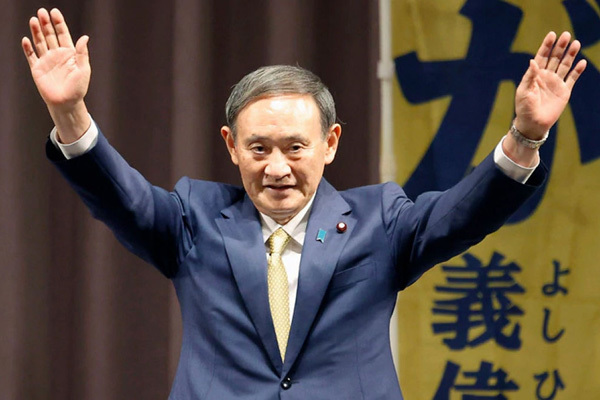Japanese Prime Minister has just finished a visit to Vietnam on October 18-20 at the invitation of Prime Minister Nguyen Xuan Phuc. This was the first overseas trip of Prime Minister Suga Yoshihide since taking office on September 16.
At the age of 71, he is a veteran politician who served as Chief Cabinet Secretary of the government led by former Prime Minister Abe for seven years and eight months.
Mr. Suga was born and grew up in Akita prefecture into a strawberry farmer family, unrelated to politics. He first ran for office when he was nearly 40 years old and was elected in the Yokohama Municipal Assembly. Less than a decade later, he ran a vigorous public speaking campaign and won a seat in the House of Representatives.
Good start
Renowned for being loyal, he never forgot his roots. As a minister, he promoted policies that would help local communities affected by Japan's rapidly shrinking population.
 |
|
Japanese Prime Minister Suga Yoshihide arrived at Noi Bai airport, starting his official visit to Vietnam on October 18-20. Photo: Pham Hai
|
During his political career, Mr. Suga has been determined to achieve set goals. Five years after Mr. Abe stepped down as Prime Minister during his first term, Mr. Suga was at the forefront of an effort to bring his like-minded friend back to power. Now, he has stepped onto the stage to be known to the world.
Prime Minister Suga had a good start when the NHK's poll showed that his new cabinet had a 62% support rate. The initial support rate for Mr. Suga's cabinet was lower than the rate of 81% for the cabinet of Mr. Koizumi Junichiro and 72% for Mr. Hatoyama Yukio and it is similar to that of his predecessor, Abe Shinzo, when he first took office.
Mr. Suga's new cabinet consists of 20 members, of which 15 are officials from the time of Mr. Abe Shinzo or earlier, so it can be considered an extended step from the Abe administration. Prime Minister Suga has retained Foreign Minister Motegi Toshimitsu and appointed a member of the Liberal Democratic Party, Nobuo Kishi, the younger brother of former Prime Minister Abe as Minister of Defense.
This is a sign that Mr. Suga will continue the foreign policy of his predecessor. It is understandable because Mr. Suga used to be a powerful arm of Mr. Abe.
Regarding whether Mr. Suga should continue with Mr. Abe's policies, NHK's public opinion survey showed that 17% said it should continue, 36% said it would be better if they continue, 20% said it should not be continued and 18% confirmed it should not continue.
An important point in the foreign policy of Prime Minister Suga is to move towards a free and open Indo-Pacific region, and the pillar remains the Japan-US alliance relationship. The Japan-US alliance serves as the foundation of peace, security and prosperity in the Indo-Pacific. Prime Minister Suga made a phone call with US President Donald Trump and the two sides agreed that Japan-America is the cornerstone of efforts to pursue a free and open Indo-Pacific.
In particular, the role of the Association of Southeast Asian Nations (ASEAN) is extremely important as it lies on Japan's essential sea routes, located in an important strategic point connecting the Indian Ocean and the Pacific Ocean. In Japan's position, it is important to further promote the integration of ASEAN, a hub for regional cooperation, as a partner sharing fundamental values such as the rule of law and democracy, in order to realize the stability and prosperity of the entire region.
With such a viewpoint, Japan continues to fully support ASEAN's efforts to deepen integration. In recent years, Japan has been supporting ASEAN's efforts, strengthening connectivity and reducing intra-regional gaps for deeper integration through ODA and Japan-ASEAN Integration Fund.
General roadmap of action
In January this year, Foreign Minister Motegi delivered a speech on the ASEAN Policy in Jakarta proposing three joint roadmaps of action between Japan and ASEAN: " nurturing people together", "Building institutions together" and "Amassing our wisdom".
The special ASEAN+3 Summit on Covid-19 response was held via teleconference in April. Prime Minister Abe at that time stated to support ASEAN countries based on three pillars, including the establishing the ASEAN Centre for Public Health Emergencies and Emerging Diseases.
ASEAN adopted the “ASEAN’s Outlook on Indo-Pacific” (AOIP) in June 2019. Japan welcomed the adoption and endorsement of AOIP, in accordance with the fundamental principles in Japan's vision of a free and open Indo-Pacific (FOIP).
Among Southeast Asian countries, Vietnam has an important geostrategic position, as it is adjacent to the East Sea, the gateway to the east-west economic corridor and the southern economic corridor. Vietnam is a rapidly growing country with stable socio-political growth and an increasing role in the ASEAN region.
As the Chair of ASEAN 2020, Vietnam has played a good role in leading member countries to strengthen cooperation in many fields, for the common goals of ASEAN. The value and position of Vietnam in the region and in the international arena are being improved. Vietnam can take advantage of and promote its advantages in political-security and economic cooperation.
The current Vietnam-Japan relationship is the broad strategic partnership for peace and prosperity in Asia, and Vietnam will be an important factor in Japan's foreign policy.
Dr. Phan Cao Nhat Anh (Northeast Asian Research Institute, Vietnam Academy of Social Sciences)

Why Japanese PM chose Vietnam as the first destination
Vietnam is the top destination for Japanese investment and among the Southeast Asian markets that Tokyo wants Japanese companies to invest in.